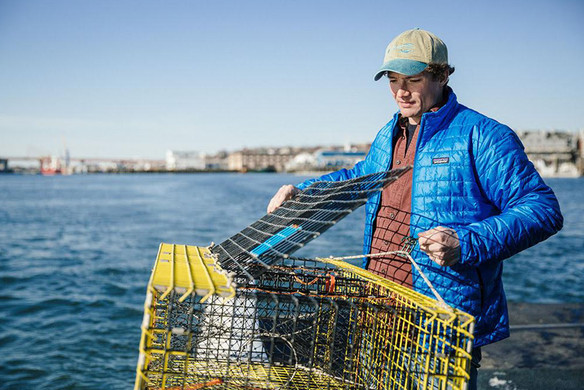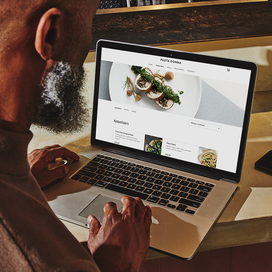American Express just launched its first podcast series, Turning Points, showcasing stories about big moments in small business. This six-episode series features small business owners with inspiring stories of entrepreneurship and strategies to tackle the challenges they face every day.
Square sellers Luke Holden (pictured) and Ben Conniff opened their first Luke’s Lobster joint in New York City’s East Village neighborhood in 2009. Today, they’ve expanded from that first small outpost into nearly 20 restaurants in more than half a dozen cities worldwide. With an emphasis on high-end ingredients and sustainable options, Luke’s also operates a full-blown seafood company with a distribution center, maintaining its own vertically integrated supply chain.
In episode five of Turning Points, Holden sat down with American Express to discuss sustainable growth, staying true to your core values, and the value of mentorship. Here are some of the interview highlights:
On working from your roots:
“I’m a third-generation lobsterman from Maine. My grandfather was a lobsterman, and my father was a lobsterman turned lobster processor and lobster dealer. I’ve always absolutely loved it — it’s my favorite job. I still go out to haul traps. It’s always been a passion.”
On staying true to your values:
“In 2009, I got the opportunity to found Luke’s Lobster. My dad and I split the initial amount for $30,000. We were very scrappy and naive. We grew from one to twenty locations in just seven years because we’ve stayed true to our core brand values. We always wanted to source responsibility, work with great people, and be hyper-fixed on taste.”
On creating a consistent customer experience:
“When our guests walk into Luke’s Lobster, we want them to feel like they just stepped into a piece of Maine. They’re seeing reclaimed buoys, old fishing nets, traps, and tools necessary to catch lobsters effectively and safely. We call our locations shacks. Part of the experience is that you’re exported to that shack on the coast.”
On becoming a full-fledged seafood brand:
“We had four locations by 2011, and then we had to decide how we maintain and improve product quality as we continue to grow. We had to get a little closer to the source. [Creating Cape Seafood took] a lot of time and resources, and was a learning curve for our future. [But] now we’re working and invested directly in the source where lobsters are landed to our seafood company here in Maine, where we ship them directly to our restaurant. There’s no middle man, so we contribute to the entire flow of our product.”
On getting (and staying) local:
“We take a localized approach at every shack. Once we’ve determined how to get the seafood from the ocean to the shack, [we have to decide] how we connect with these guests and make ourselves a meaningful addition to the community. Some offers change based on local sources (like bakeries and breweries), but we always stay consistent with our signature item, the lobster roll. That’s unchanged at every location.”
On finances:
“We are continually investing in our financial system. [When guests use credit cards, we want it to be] something that no one has to think about. We accept every major credit card, and all merchant processing costs the same, it’s pretty seamless.”
“When you think about managing a business and the flow of information, it is substantially easier to imagine a business that is all credit cards and no cash. If we could go credit card only, that would really simplify our business.”
On having mentors:
“The beautiful thing is whether you’re just starting out or are the CEO of a public company, there’s always a business out there that is doing something a little different, a little larger, there’s always the ability to be learning and improving. I’ve certainly latched onto mentors and I’ve adopted the pay-it-forward model as well. I try and have at least two conversations a week with young entrepreneurs. It’s funny how those conversations work, too — often even if they are coming to me for advice, I’m taking bits of experience and knowledge away from those conversations.”
Turning Points, a new podcast from American Express, showcases stories about big moments in small business. Listen in on candid conversation with successful small business owners about the pivotal moments, challenges, and lessons learned in growing their companies. You’ll also get practical advice on how you can grow or start a small business and navigate turning points of your own. Listen here.
![]()











